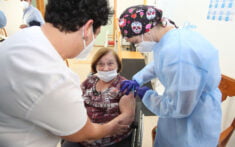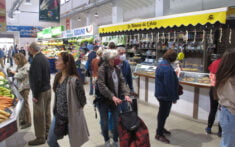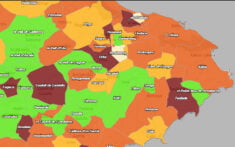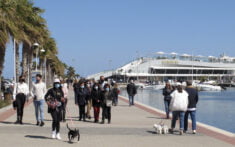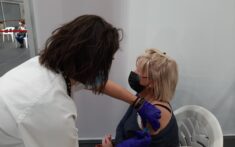Health professionals who live day to day in different hospital centers, describe to Dénia.com how their work is being and how it affects them personally and their own families. Extreme precautions and pain from difficult situations are the common denominator.
«El día a día en La Pedrera es muy diferente»
Toñi López has been a nurse at the HACLE (Hospital for the Care of Chronic and Long-stay patients) of La Pedrera, in Dénia since its inception. Despite his long experience, since he has been practicing in Dénia since 1986, he has noticed that the situation has now changed as never before: «Cada paciente está aislado en su habitación, y solo pueden salir al pasillo de uno en uno, no pueden recibir visitas de familiares (tan solo por videoconferencia), y desde el centro se informa a las familias una vez por semana». If we consider that La Pedrera is an open hospital and that activities are usually carried out every day, the fact of isolation is even more noticeable. As Toñi explains, «Esta es una situación difícil que produce mucha tristeza, y aunque la mayoría lo entiende, la realidad es que llevan un mes sin ver a su familia».
Both health personnel and patients have the psychological support they need and, furthermore, they have had no problem with the protection material because they are not on the front line like other hospitals. According to Toñi López, «en el único contacto que tuve con el caso positivo en COVID-19 que hubo en el centro, fui con todo el equipo EPI. También tuvimos una sospecha baja de posible caso positivo y se realizaron todas las pruebas con la protección adecuada, que viene a ser el doble de la protección de aislamiento a gotas». The policy that the Hospital de La Pedrera follows is, in the case of a positive, transfer him to his home hospital, since HACLE patients are fragile in this situation, they are at vital risk.
When a toilet comes home
As the nurse tells us, the staff is in good spirits and strictly follows the protocol: «Personalmente no estoy preocupada por mí, pero sí por mi familia, tienes miedo a contagiarlos y eso es lo que me produce algo de ansiedad. En casa vivo con mi marido que pertenece al grupo de riesgo, y con mi nieto, al que cuidamos precisamente porque sus padres son anestesistas». López takes all precautions: when entering the house, the first thing is to leave the clothes to wash, shower, and then he is allowed to come into contact with his family. Her grandson does not get in his car, and every eight days he makes the purchase so as not to expose himself anymore.
«Vivimos momentos de impotencia y frustración, pero seguimos adelante por todos»
When Alberto Lozano arrives home, the clothes he has brought to work remain in the trunk. And it does not take contact with its family until all the hygienic measures are carried out. Alberto is a Dénia neighbor and works as a nurse at the Hospital de la Vila Joiosa.
This last month has been on a rotating basis: «Empecé a principios de marzo con la llegada de los primeros casos y se inició todo el cambio en el hospital para acoger a los positivos. Se anularon servicios para tener preparados nuevos espacios para lo que pudiera venir. Puedo decir que no se han colapsado las UCI ni se ha tenido que dejar de ingresar a un paciente por no ocupar las UCI». Alberto acknowledges that he changed the protocol and caught everyone a bit off guard, causing some disorganization, but he never lost control. Each hospital has adapted as it could within its resources, and now people are more aware and the situation more normalized, according to the nurse.
According to Lozano, «Esta situación que estamos viviendo es muy difícil: ves al paciente aislado, solo, sin poder ser acompañado por un familiar. En el caso de los fallecimientos es muy triste, sientes impotencia cuando se lucha mucho y el paciente no sale adelante, y además sus familias no han podido estar con ellos. Es una situación fría porque tú tampoco puedes tener ningún tipo de contacto. En mi caso, durante dos semanas hice diez turnos en los que hubo tres fallecimientos, y es frustrante ver cómo la gente se apaga, sientes impotencia absoluta porque ya no se puede hacer nada.» The nurse points out that it is a total, radical change in attitude, that the health personnel are experiencing moments of saturation but that they continue for everyone.
Psychological help to toilets
Due to the great burden of care, emotional suffering and stress suffered by health professionals and patients in this coronavirus situation, the Ministry of Health announced the provision of psychological service to help cope in a better way day to day.
Both Alberto and Toñi agree that this psychological attention is provided to professionals and patients, «son unos cinco minutos de sesión y aunque al principio nos hacía gracia estos encuentros, ahora los vemos como un momento de desconexión y de tomar fuerzas para seguir con la jornada», explains the nurse.
For his part, Lozano points out that in the face of the great emotional charge that is lived from within «creo que muchos profesionales necesitarán ayuda psicológica para superar lo que están viviendo, sobre todo los que más contacto han tenido o tienen con los pacientes».




